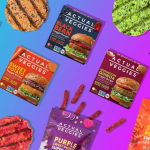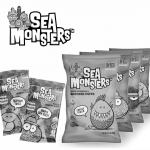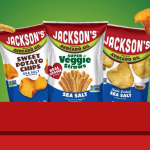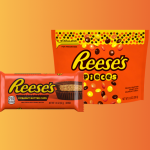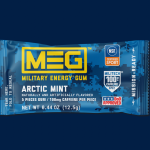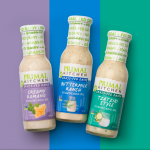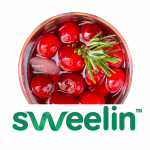Protein Drip: Huel Extends Into Apparel with ‘Huelwear’ Clothing Line
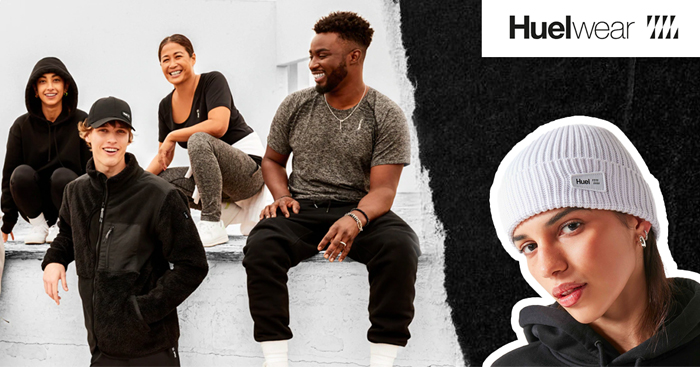
Wellness aficionados know you are what you eat. But now, Huel is hoping consumers will also wear what they eat.
Last month, the U.K.-based protein and meal replacement beverage maker announced its latest product line, Huelwear, a sustainably produced fashion line featuring animal-free clothing.
The clothes are available direct-to-consumer via Huel’s website and the line features men’s and women’s fits – including t-shirts, hoodies, joggers, sports bras and jeans – as well as hats and beanies. Huel touts the clothes as environmentally conscious and ethically made; prices range from $50 per organic cotton t-shirt to $120 for skinny jeans. A kids’ line is listed as coming soon.
According to Huel founder Julian Hearn, Huelwear came about through consumer demand. For years, customers have requested more clothing options beyond the limited merchandise available via Huel’s website. The company had avoided expanding its clothing options in order to remain focused on the core powder and drinks business, but as Huel has grown into a global operation he said the timing felt right, Hearn said.
“Starting a business in any category is hard, and growing is scaling is hard, so diluting your focus too much can be dangerous,” Hearn said. “But we’re quite a big business now. So I felt that we could take something different on, and people like our aesthetic, they like the monochrome look and feel, there’s the power of simplicity in our design, and they like the brand, we have very engaged customers. So it felt like something that would do well.”
According to Hearn, Huel brought in around $128 million in revenue last year and now has over 250 employees to service its business across the U.K., Europe and the U.S. To support Huelwear, the company hired several new employees to focus solely on the clothing business, but Hearn said he tackled the launch with a similar approach to launching new food and drink innovations with much of the clothing business being handled by the existing operations team.
It’s common practice for food and beverage brands to produce promotional clothing featuring brand logos, but few emerging companies have introduced permanent product lines. There are some existing models for Huel to follow, however: last year, Oatly introduced its ReRuns series of limited edition upcycled clothing, and Liquid Death has shown that an extensive fashion line can be a lucrative revenue stream for CPG brands. The canned water company sold more than $3 million worth of clothing in 2021 and about 52% of its direct-to-consumer water sales also included items from the brand’s online merchandise store.
For Huel, Hearn said the business has built up a loyal consumer base that can justify the expansion into a broader lifestyle brand. The company has dubbed its core community “Hueligans” and the Huel brand has tailored itself around wellness, fitness and performance. The clothing matches those contours with the addition of workout shirts and joggers.
“Over the years, we’ve probably given out millions of t-shirts, and I often see people wearing those t-shirts proudly,” he said. “So I think there’s definitely a lifestyle aspect to it. We started off as a food brand, but lots of companies start off somewhere and progress somewhere else. You know, Apple started as a computer business and ended up as a phone business really.”
Huelwear will remain an ecommerce exclusive business for the time being; Hearn noted that he takes a cautious approach to all business expansions, and he waited over two and a half years to launch Huel’s drinks into retail.
While the launch represents a significant expansion outside of food and beverage for Huel, Hearn said the brand is still focused on its core portfolio. Last year, the company introduced an instant meal line – Huel Hot & Savory – with flavors like cajun pasta and Thai green curry. That line, he said, has grown to become the company’s second best seller after its flagship powder line.
Huel is now looking at roughly 40% growth in 2022, he added. But the growth has not come without its challenges: Hearn said that the company faced significant setbacks during the COVID-19 pandemic as consumers had less need for on-the-go meal replacements and home cooking rose. Now, even as consumer mobility returns, the company is also facing shipping challenges amid global supply disruptions; while it used to take about four weeks to ship product to the U.S., Hearn said it now takes around 14 weeks.
Despite the hurdles, Hearn said the business is continuing to see strong adoption rates with new consumers. The brand’s ready-to-drink beverages are available in retail throughout the U.K., Germany and Sweden and in the U.K. brick-and-mortar sales have surpassed online sales for its RTD line. The company will continue to expand its global retail presence this year, he said.
Huel previously dabbled with a U.S. retail launch, but pulled back during the pandemic and Hearn said the American business is “99.9% online.” The company is now looking to “dip our toes” back into the U.S. retail business with select CVS stores across the country, but Hearn cautioned that he is taking a slow approach to the rollout.
Huel will continue to launch “one to two” major innovations per year, Hearn said, with additional food and drink products expected to come later in 2022. As well, the company regularly reformulates and experiments with its existing product line with an ethos of continuous improvement, he said.
“We’re very data orientated as a company,” he said. “We know our retention rates, we know what those are, and we know which products don’t retain quite as well. So we always go back and try and fix those, but in terms of this year, I’m excited about what’s coming.”
Explore the Nombase CPG Database
Head to Nombase to learn more about the tagged companies and their offerings.



